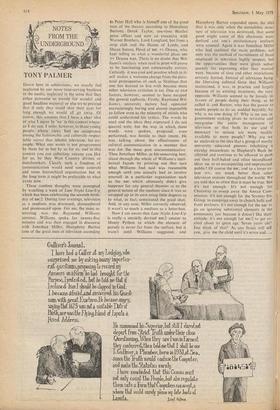NOTES u FROM THE. UNDERGROUND r TONY PALMER
Down here in subterranea, we usually feel neglected by our more time-serving brethren in the media, neglected in the sense that they either patronise us merely for scandal and good headline material or else try to pretend that if only they could shut their eyes for long enough we would all go away. Of course, this assumes that I have a clear idea of who I mean by 'we' in this context where- as I do not. I refer, however, to those young people whose views find no acceptance among the fashionable and culturally respec- table mores that inhabit television, for ex- ample. What one wants is not programmes by them for us but by us for us, and in this context you can substitute anyone you like for us, be they West • Country divines or metalworkers. Clearly such a freedom of communication would need some controls and some hierarchical organisation but in the long term it might be preferable to what exists now.
These random thoughts were prompted by watching a week of Late Night Line-Up which has been celebrating the seventh birth- day of anc2. During four evenings, television as a medium was discussed, dismembered and pronounced upon. For me, the most in- teresting was the Raymond Williams seminar. Williams spoke for twenty-five minutes and was then engaged in discourse with Jonathan Miller, Humphrey Burton (one of the great men of television according
to Peter Hall who is himself one of the great men of the theatre according to Humphrey Burton), Derek Taylor, one-time Beatles' press officer and now an executive with Warner Brothers, Lord Longford, hot from a strip club and the House of Lords, and Shaun Sutton, Head of BBC TV Drama, who kept telling us what a wonderful place BBC TV Drama was. There is no doubt that Wil- liams's analysis when read in print will prove to be fascinating and substantially correct. Certainly it was cool and positive which in it- self makes a welcome change from the para- noid grotesqueries of such as Shulman that one has learned to live with because most other television criticism is tat. One or two factors, however, seemed to have escaped the general euphoria. Firstly, Raymond Wil- liams's university lecture had appeared excruciatingly boring and almost impossible to follow even to the minority of minds who could understand his syntax. The words he used and the ideas they expressed I do not quarrel with; but the way in which those words were spoken, projected, even performed, was hostile to their intent. He was talking about the effectiveness of cultural communication in a manner that was for the most part uncommunicative. Then Jonathan Miller, at his unnerving best, sliced through the whole of Williams's intel- lectual façade by pointing out that sure what Williams had said was reasonable enough until you actually had to involve yourself in a particular organisation such as the BBC which ultimately didn't give tuppence for any general theories as to the general nature of the medium since it was so wrapped up in its own smug little dogmas as to what, in fact, constituted the good shot. And, in any case, Miller correctly observed, it wasn't so much a medium as a letter-box.
Now I am aware that Late Night Line-Up is really a sneakily devised Bac2 answer to Monty Python in which the element of parody is never far from the surface, but it wasn't until Williams suggested, and
Humphrey Burton expanded upon, the idea that it was only when the monolithic struc- ture of television was destroyed, that some good might come of this electronic won- derland and one's revolutionary instincts were aroused. Again it was Jonathan Miller who had outlined the main problem; not only was the method of recruitment of those employed in television highly suspect, but the opportunities they were given subse- quently for expressing what they wanted were, because of time and other restrictions. severely limited. Instead of television being the liberating cultural force that Williams maintained, it was, in practice and largely because of its existing structures, the very opposite. Williams seemed to be loosely in favour of people doing their thing,. as he called it, and Burton, who has the power to enable people to do so, nodded boyishly. So why is no one doing it? Why is no one in government making plans to revitalise and reorganise the entire management of . television so that both its use and if necessary its misuse are more readily available to more people? Why are we so enslaved to the idea that a group of mostly university educated gnomes inhabiting a circular mausoleum in Shepherd's Bush be allowed and continue to be allowed to push out their half-baked and often secondhand ideas on to an unsuspecting and unprotected public?. Of course the Bac, and to a lesser ex- tent ITV, are much better than other television stations throughout the world. We are told this so often that it must be true. But it's not enough. It's not enough for Chataway to sweep away the Annan Com- mission; it's not enough for the Seventy-Six Group to campaign away in church halls and front parlours; it's not enough for the 013C to go on ignoring substantial elements in the community just because it doesn't like their attitude; it's not enough for anc2 to get ex- cited about its great age. Seven years old! Just think of that! As any Jesuit will tell you, give me the child until it's seven and ...


































 Previous page
Previous page